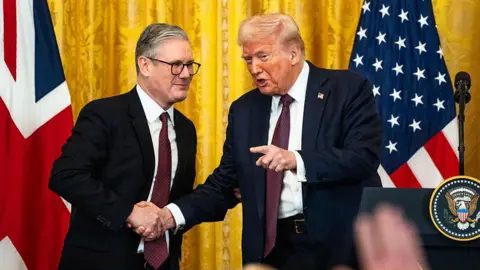UK temporarily spared from Trump's 50% steel tariffs
 Getty Images
Getty ImagesThe UK has been temporarily spared from US President Donald Trump's executive order doubling steel and aluminium tariffs from 25% to 50%.
The order raises import taxes for US-based firms buying the metals from other countries from Wednesday - but the levy remains at 25% for the UK.
However, the UK could end up facing the higher rate if its deal signed with the Trump administration last month, which would see steel and aluminium tariffs axed, does not come into force.
Imports of UK steel into America are currently subject to tariffs, but the UK government said it wanted to implement the agreement to remove them "as soon as possible".
A spokesperson said the government was "committed to protecting British business and jobs", but the Conservatives said the order was a "fresh tariff blow" and accused Labour of leaving "businesses in limbo".
Trump said in the order that the UK needed "different treatment" because of the US-UK Economic Prosperity Deal (EPD) signed on 8 May 2025.
However, Trump later added that the US might increase the tariff on the UK "on or after July 9 2025" if it "determines that the United Kingdom has not complied with relevant aspects of the EPD".
How we reached this point
- 10 February: Trump announces 25% tariffs on all steel and aluminium imports to the US - the new duties kicked in on 12 March
- 2 April: Trump announces most countries - including the UK - will face a 10% "baseline" tariff on all goods sent to the US
- 8 May: UK and US agree to reduce or remove some levies
- 4 June: US raises import taxes for steel and aluminium to 50% - the levy temporarily remains at 25% for the UK
The UK's carve-out in the executive order comes after Business Secretary Jonathan Reynolds met with US Trade Representative Jamieson Greer in Paris on Tuesday.
Last month, the US and UK agreed a deal to reduce or remove tariffs on some goods, which included cutting tariffs on UK steel and aluminium to zero and reducing import taxes on cars to 10%. The agreement is yet to come into force.
The US is the biggest importer of steel in the world, after the European Union, getting most of the metal from Canada, Brazil, Mexico and South Korea, according to the US government.
When it comes to the UK, America is the destination for about 7% of the country's steel exports worth more than £400m, meaning tariffs have a big impact on the industry.
The UK is also home to suppliers of specialist steel products, which ship most of their goods to customers across the Atlantic.
Uncertainty and confusion
Gareth Stace, the chief executive of UK Steel, said it had been "a rollercoaster ride of uncertainty in the last months, weeks and days", but that the industry could "breathe a temporary sight of relief" that the UK faced tariffs of 25%, rather than 50%.
He said "what we really want to get to is those tariffs removed" as agreed by the US and UK in May.
"We hope that deal can be made soon enough," he added.
If that deal gets over the line, the UK steel industry would benefit from US importers having to pay no tariffs compared with products from the EU and other countries, he said.
However, an indirect impact is that steel redirected from the US to the UK and other markets could "displace domestic producers", he added.
Rowan Crozier, chief executive of metal-stamping firm Brandauer in Birmingham, said in the carve-out would mean UK-based firms would not be seeing the same import tariffs as global competitors, but he warned "far reaching" uncertainty was "the more damaging element".
"That's one thing that the Trump administration continues to do, is to create confusion, with the hope of getting a deal," he told the BBC's Today programme. "Essentially, our customers are less confident in forward planning, or ordering what they need".
However, he said that as a specialist manufacturing business, his US customers had little choice but to pay the tariffs at present.
President Trump has imposed tariffs on many countries since returning to the White House in an attempt to encourage businesses and consumers to buy more American-made goods.
Tariffs are taxes paid by businesses importing goods from foreign countries.
Trump hopes his policy will boost US manufacturing and jobs but many economists have warned it could lead to higher prices for consumers.
Alan Auerbach, University of California director of tax policy and public finance, said more US steel production was "not going to happen overnight".
"In the short run, buyers are simply going to have to pay more for the steel that they're buying from foreign sources," he said.
There may be more US production eventually, but uncertainty over what tariffs will look like in the future "undercuts the aim of getting more US production", Mr Auerbach added, because firms need that certainty to make investment decisions.
Shadow business secretary Andrew Griffith said: "Labour's botched negotiations have left businesses in limbo and this country simply cannot afford their continuing failure."
Although UK steel producers may get zero tariffs, to get the trade carve-out the UK cut tariffs on some US beef products, and ethanol. The UK ethanol market in turn is a big customer of wheat farmers.
UK efforts to protect those industries could be viewed as backsliding, BBC News business editor Simon Jack said.
